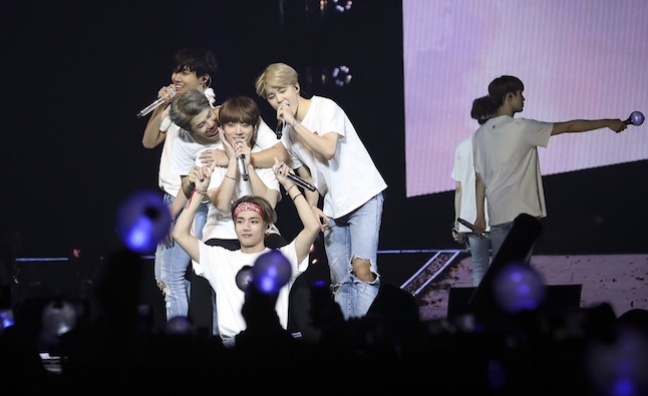Britain has been in the grip of BTS mania, which peaked with their first UK dates last week - two sold-out 16,000-capacity shows at The O2. The group’s appearance broke several records for social media and merchandise, with the depleted merch stands securing them the best performance at the venue since The Rolling Stones in 2012. The band are the first Korean act to score a UK Top 10 album (with the help of The Orchard and Proper).
The BTS European tour is now wrapping up with two shows at the AccorHotels Arena in Paris (19-20 October), ahead of a run of dates in Japan, Singapore, Hong Kong and Thailand. Here, Phil Bowdery, executive president, European touring, Live Nation, looks back at their spectacular shows at The O2 and assesses their impact as a touring force and their future potential…
Were you surprised by the popularity of the O2 shows?
“I’ve not been surprised because it’s obviously a huge phenomenon that they’ve created, so it was always going to be special when they came. When we put it on sale it sold out very quickly. The demand far outstripped what we had available, it was brilliant.”
Who was the O2 audience for BTS?
“I spent a lot of time and wandered around the venue. It was a selection of all aspects of life, from an older demographic down to the kids. It wasn’t as young as I thought it was going to be, there were a lot of 13 to 15-year-olds, which was the average and they knew every song and every move, they were obviously uber fans. The band make sure their fans are completely involved in everything they do. It was a joy to watch.
“The majority are Korean songs but there was a little bit of English in there, and in between the songs there was a lot of English being spoken as well as Korean, it was lovely to see.”
I thought it was spectacular, it was an incredible production
Phil Bowdery
How did you rate the production of the show?
“I thought it was spectacular, it was an incredible production. They came on stage at 8.15pm and didn’t finish until 11pm. They put on a hell of a show and obviously a huge amount of content, it was a long show and they gave the kids a wonderful experience."
BTS were hard to miss during their UK visit, were you happy with the media coverage?
“When I first started talking about it and I was mentioning BTS to people, I was getting vague looks of ‘What’s that?’. But now everyone’s aware of BTS.”
Were they an unknown quantity when you booked them at the beginning of the year?
“Yeah, obviously because they hadn’t played here before so you’ve always got that unknown element to it. I do my research, so I knew how strong they were, I could see the depth of it. When you’re a promoter, you gauge a show by the amount of phone calls you have - we call them the ‘while I’m on’ call. You’ll get a phone call for someone you may not have spoken to for a very long time, and they’ll say, ‘While I’m on, can I get BTS tickets?’. There were an awful lot of those phone calls. So I knew how strong it was.”
How did BTS break through in the UK?
“It’s social media, there’s no question. They have a great rapport with their audience through social media. I was very fortunate to have been involved with One Direction on their European tours, and that was another piece of evidence that social media is very strong. Because they spoke with their fans through social media, it wasn’t about adverts in newspapers - that wasn’t going to get to the fans. You have to connect with them in the way that they know best, and that’s exactly what we did.”
How did that influence your marketing for the shows?
“It was a very big digital experience between us and the band, a coordinated approach. They were adamant in the way they wanted it to be done, it was all about making sure that it was the fans that were there, that they got the opportunity to buy the tickets. They didn’t want to entertain any form of pre-sale, they didn’t want any opportunities other than a straightforward normal sale. They wanted to make sure that everyone had that opportunity. If you wanted to buy a ticket, it was there for you to do so. If you didn’t get one, it was purely because the thing sold out.”
Where could they play next time?
“I think they’ve enjoyed it, I think they like the look of coming back to Europe, not just to the UK. They’ve got a similar audience throughout Europe, and I know they have plans for Asia and the Far East, and they have plans for America in the same way they have plans for Europe. I think their problem now is planning it. They are going to need a break at some point, but they could just keep going. It’s just about management, planning how they’re going to do it. But there is an opportunity for sure.”
Could they do a big outdoor show here?
“That’s always a possibility - or even a longer run indoors.”
Are there lessons other acts could learn from BTS about going global?
“They are pretty astute, to conquer America, Europe and the Far East, that’s not bad. They are worldwide, this is not a one-off."
To read Music Week’s story on how BTS could kick off a new wave of K-pop in the UK, pick up the latest issue - or subscribers can click here. To subscribe and never miss a big industry story click here.











